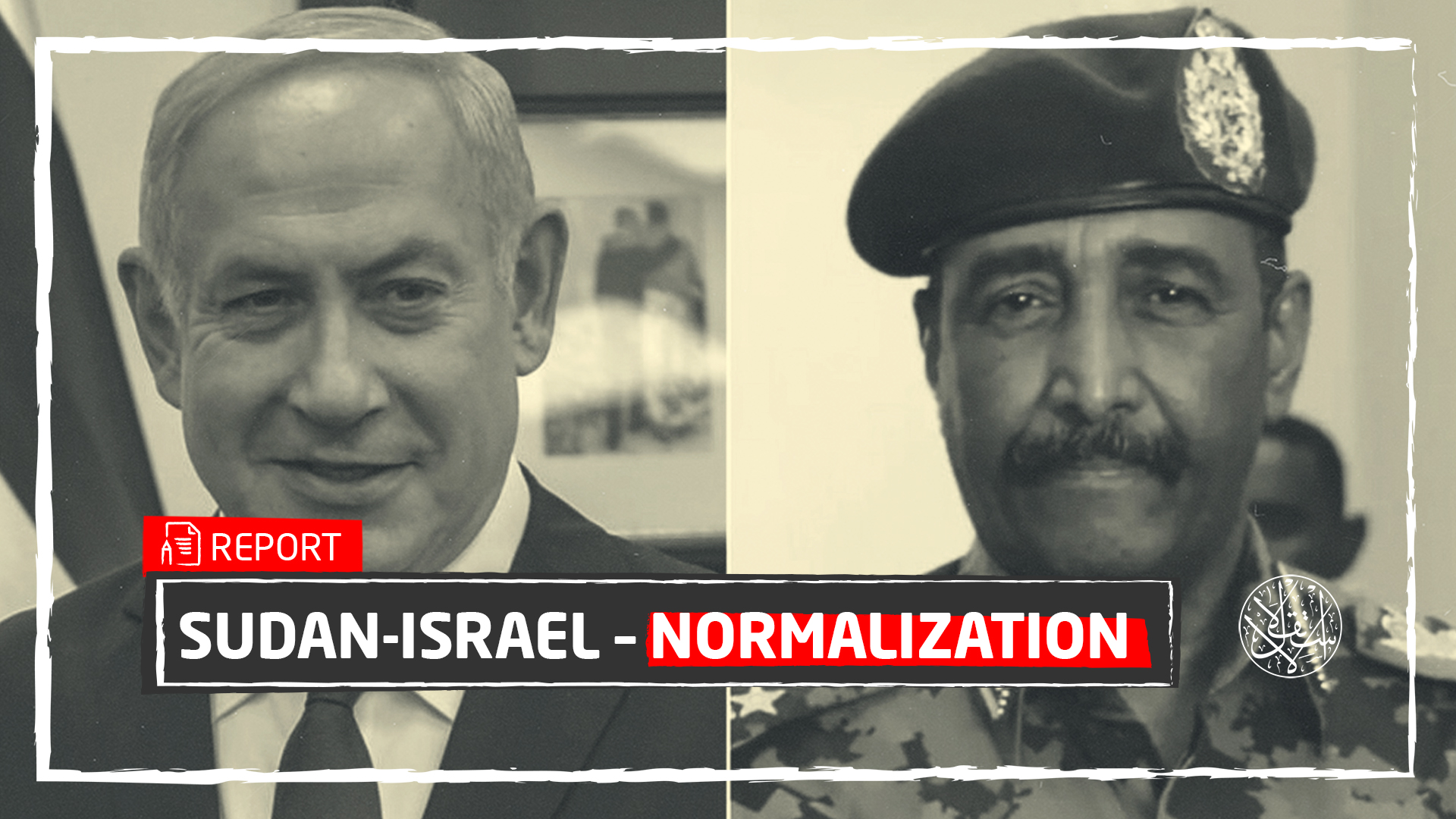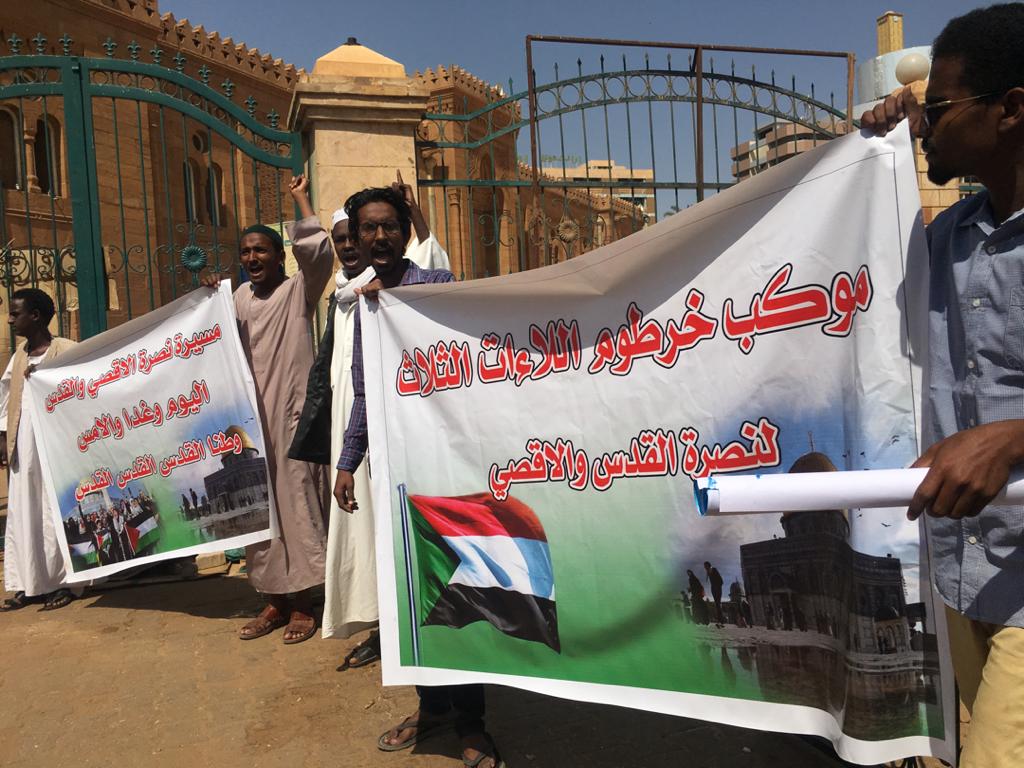Despite The Aggression on Gaza, Why Did the Rulers of Sudan Fall into the Arms of Israel?

In the midst of the Israeli aggression against the Palestinian people, and while the occupied city of Jerusalem is revolting, and the Gaza Strip is subjected to continuous bombardment, there have been angry Islamic and Arab reactions that support the Palestinians in their struggle.
Hamdok's position caused angry popular reactions, and the Sudanese people and their sects sent harsh messages to the Sudanese Prime Minister and Chairman of the Sovereign Council, Abdel Fattah Al-Burhan.
The parties and elites demanded Hamdok and Burhan to refrain from accepting normalization, and to respect the popular and national will of Sudan, whose history has been marked by honorable stances rejecting the occupation of Palestinian lands.
Sudanese Prime Minister Abdullah Hamdok shocked Sudanese and Arab public opinion, when he held a meeting with the Israeli newspaper "Maariv", on May 19, 2021, bypassing the harsh violations of the occupation state against the Palestinian people, ignoring the anger of his people in solidarity with the cause.
The situation was further exacerbated by the statements made by Hamdok in the context of the normalization of relations, when he told the Hebrew newspaper that "the normalization process with Israel is in the interest of Sudan national stability," stressing that he "will abide by this agreement."
He added: "This is in our interest and this is what we want. We have taken on commitments and we will implement them. We are completely decisive about the implementation of the agreement with Tel Aviv." The position of the head of the Sovereign Council, Lieutenant-General Abdel Fattah al-Burhan, was the same as Hamdok. On May 21, 2021, he strongly defended the option of normalization with Israel.
Al-Burhan said, in a television interview with "France 24", that normalization has nothing to do with the Palestinians' right to establish their state.
Angry Demonstrations
The controversial stances of the rulers of Sudan came after 11 days of the brutal Israeli aggression, where the missile attacks of the occupation forces on the besieged Gaza Strip, by land, air and sea, resulted in 243 Palestinian martyrs, including 66 children, 39 women and 17 elderly people, while resulting in 1910 severely injuries.
This was rejected by the Sudanese people in form and content, as well as the foreign policy of the regime towards the occupying power. The Sudanese people expressed their anger at the painful reality of the entire regime, which slipped into normalization, which was in a weak position within the bloody events in the occupied Palestinian territories.
After Friday prayers on May 21, 2021, the Sudanese demonstrations in support of Palestine and rejecting normalization began. The participants in the march chanted slogans against Al-Burhan and Hamdok, against the background of the normalization agreement with Israel, and chanted slogans such as "O Burhan, O agent, no normalization with the entity." The Sudanese Communist Party, for its part, issued a statement on May 17, 2021, calling on his country's government to immediately cancel all steps of normalization with Israel.
It added in the statement, that "the approved boycott of Israel law of 1958 must be restored by an elected parliament respecting the principled position of the people."On November 7, 2020, the Communist Party announced its withdrawal from the forces of freedom and change, the "ruling coalition", and the forces of national consensus in the country due to normalization.
It is noteworthy that the Sovereignty Council and the Ministers of Sudan have finally approved a bill that cancels the "Israel Boycott Law". On October 23, 2020, Sudan announced the normalization of its relationship with Israel, in light of the opposition of several political forces, which announced their total rejection of establishing relations with the Israeli entity, including parties participating in the ruling coalition.
Capital of Disappointment
The National Congress Party (the former ruler) described Khartoum as the "capital of the disappointment" for the Palestinian people. He said in a statement addressed to the Sudanese authorities, "We are addressing you today, about the situation of humiliation, hardship and poor living conditions.
The sovereignty of the Sudanese people has not been respected, so foreign influence has become present in all the actions of the transitional authority," indicating that the main reason for the regime's normalization is a complete obedience to external forces. He stated that: "Our country has become a hotbed for foreign intelligence and agents, and Khartoum disappointed the Palestinian people when the whole world are supporting them. Khartoum witnessed a historic position in the Arab defeat against Israel in the setback of June 5, 1967, when Sudan hosted the Arab summit conference on August 29, 1967, which was known as the "Three No's" summit, represented by "no peace, no recognition, no and negotiations with Israel.’’
From that time, Khartoum was known as the "capital of the three nos", and it maintained its steadfast stance against Tel Aviv, until the arrival of Burhan who ruled the Sovereign Council. In the same context, the Sudanese People's Forces Movement "Qawam" announced its complete rejection of the government's directions, and its support for the Palestinian people, and said in a statement: "The Palestinian resistance presented a high performance that broke the arrogance of the occupation army and exposed its brutality, crimes and violations of all human values."
It added: "Congratulations from the people of Sudan to the people of Jerusalem, Gaza and Palestine, and all the nation of Muslims and all the free people of the world, for the dear victory that the valiant Palestinian resistance scored against the usurping Zionist occupiers." It also called on the transitional government to "immediately withdraw from the normalization agreements," which it described as shameful.

Against the People
Sudanese politician, Dr. Ibrahim Abdel-Ati, said in his interview with Al-Estiklal, commenting on the Sudanese government’s position on the recent events in Palestine, that “Hamdok and his government do not represent the great Sudanese people, and his firm position on the Palestinian issue, represented in the complete rejection of all aspects and forms of normalization, also can’t represent our people.”
He stated: "We have to realize that Hamdok and his government are well aware that they do not have a real popular support, and that many institutions, led by the armed forces, do not want to work for them." Therefore, he presented all the means that support him, starting with the request for international guardianship over Sudan, which is a crime of high treason, to normalization with Israel, and insisting on moving forward with that particular file. And he added".
He knows very well that establishing relations with the occupying state will open the doors of relations with Europe and the United States." He added: "Hamdok, who promotes public opinion about the achievements of lifting sanctions on Sudan, and providing material and financial support to the people through loans and grants, as gains resulting from foreign policy and normalization with Israel, overlooks the catastrophic failure of his regime in managing the country politically and economically." In his estimation, "these grants are pretexts to loot Sudan's wealth, and the people will remain in the same deteriorating financial situation."
He added, "Therefore, it is important to always stress that the position of the Sudanese people is completely different, and there are many parties, demonstrations and protests that reject the context of normalization." He concluded, "If Hamdok's government was elected and represented the people, it would not have dared to do this, but it is a fragile government that was imposed at an ancient moment in Sudan's history."











